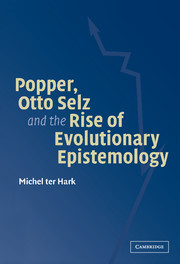Book contents
- Frontmatter
- Contents
- List of Illustrations
- Preface
- 1 Tracing the Genesis of an Idea
- 2 Psychology of Thinking, Evolutionary Theory, and Psychoanalysis
- 3 Popper and the Foundations of Pedagogy
- 4 Otto Selz and the Science of Problem Solving
- 5 Popper's Psychology of Knowledge
- 6 Evolutionary Epistemology and the Mind-Body Problem
- Notes
- Bibliography
- Index
1 - Tracing the Genesis of an Idea
Published online by Cambridge University Press: 07 December 2009
- Frontmatter
- Contents
- List of Illustrations
- Preface
- 1 Tracing the Genesis of an Idea
- 2 Psychology of Thinking, Evolutionary Theory, and Psychoanalysis
- 3 Popper and the Foundations of Pedagogy
- 4 Otto Selz and the Science of Problem Solving
- 5 Popper's Psychology of Knowledge
- 6 Evolutionary Epistemology and the Mind-Body Problem
- Notes
- Bibliography
- Index
Summary
Philosophy of Science and Evolutionary Epistemology
The idea that we acquire knowledge by a process of trial-and-error elimination has been one of the truly great ideas of the twentieth century. As no reader of his philosophical and autobiographical work could have failed to notice, Karl Popper credits himself for having invented this idea. In his work from the early 1960s onwards the theory of trial-and-error elimination turns out to be not simply a part of Popper's comprehensive philosophy but rather one of its key features; it is at the bottom of some of his most spectacular achievements in methodology, epistemology, the philosophy of biology, and even political philosophy. Indeed, it is put forward at once as a model for the growth of individual knowledge (both human and animal), the growth of life (Darwin's theory of evolution), and the growth of scientific knowledge (philosophy of science). As happens so often with innovative ideas, the theory of trial-and-error elimination derives much of its glamour from the theory it rejects: because the mind is a tabula rasa, sense perception is the origin of all (human) knowledge. Popper nicknames this empiricist view as the “bucket theory” because it conceives of the mind as nothing but the conduit for sense impressions, an empty bucket to be filled by the accumulation and storage of information. The bucket theory of knowledge and mind may be firmly entrenched in both philosophy and psychology (and even in common sense), yet it is roundly rejected by Popper.
- Type
- Chapter
- Information
- Publisher: Cambridge University PressPrint publication year: 2003



